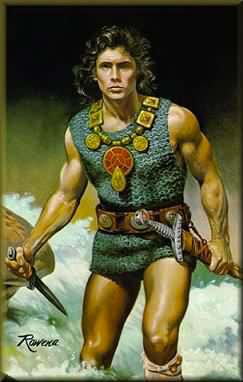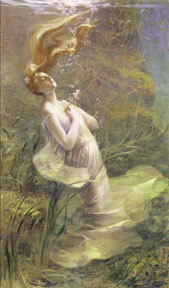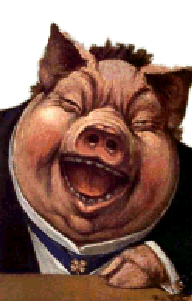![]()
![]()
![]()
THE WEBFOLIO OF THE MILLENNIUM
by Rosie

(Supposedly)
![]()
![]()

OEDIPUS REX
Oedipus Rex in my opinion is a unique and interesting myth. It is not a wonder as to why this tale has persisted for so many generations, and has even been praised in the Poetics of Aristotle as a model for classical tragedy.
There are several factors which I find quite interesting about Oedipus Rex. First of all, the different reactions that people have had when reading the story is practically beyond belief. From psychologists quoting an "Oedipus Rex Personality" or subconscience, to philosophers claiming, "A man cannot run from his fate", there has been numerous reactions from different people throughout the century. This is the result from a story well written.
Sophocles undoubted was a genius at storytelling and playwriting. The brilliance of his writing included themes and "lessons" in which we as the reader or an observer (as were the case of the ancient Corinthians) can derive. For example: As the chorus points out, "wisdom alone is an insufficient rationale for living". Oedipus'ss obvious flaw, one in which we can all agree on is that his pride was too high. This is because he solved the riddle of the Sphinx, something no one at the time could have done. He thought his wisdom alone was sufficient for his kingdom. During the story, we see the power the Thebans give him. This unfortunately raises his head a little too high above the clouds. The Thebans practically elevate him to a god and savior even though they seem to show some respect to their won gods by saying, "But we pray to you (to Oedipus), You cannot equal the gods". Yet Oedipus, in his most prideful attitude states to the Chorus, "you pray to the gods? Let me answer your prayers." Due to Oedipus's arrogance and gross presumptuousness, he fulfills his own prophecy in which of course, brings disastrous consequences. This as mentioned previously, is one of the thematic lessons Sophocles added in his story.
Even though Oedipus was an arrogant man, we find certain touching sides to his personality. This is another brilliant part of Sophocles work � his character development. As hard as it might sound to somebody who has never read the play and who is going by what I have written so far, Oedipus was indeed a very sentimental person. For starters, he must have loved his parents because he left home when he heard the prophecy. He didn'st want to kill them as the prophecy would condemn him to do. Next, he cared for the nation when he offered to help them find Laius's killer, especially when Creon came back with the report Oedipus said, "Speak to all. The sorrow that I bear for these is more than for my own life". Oedipus must have given up his comfort at home in order to have his parent'ss life spared. He also solves the riddle of the Sphinx, saves the Thebans, and actually becomes empathetic towards his people.
Though Oedipus was quick-tempered and paranoid towards Creon as well, he came to humbly regret this when he said, "Oh no, what can I say to him? How can I ever hope to win his trust? I wronged him so, just now in every way I was so wrong." This shows humility embedded within Oedipus's character.
Based on research, many cultures seem to enjoy the play. It is said to be suspenseful yet touching.

HAMLET, PRINCE OF DENMARK
Shakespeare'ss Hamlet Prince of Denmark, is probably the most popular of all his works. It has been accepted by most philosophers, dramatists, and psychologists as a unique and true masterpiece for all cultures. Aside from the excellent storyline and the artistry involved in Shakespeare'ss use of language, the appeal of this play probably rests on Hamlets rather mysterious character. His character is one who behaves �mad's and is reluctant, not to mention indecisive to act on the murder of his father. Hamlet'ss main drive was to avenge his father'ss death. Yet his complicated dilemma consisted of morals and ethics which he did not wish to bypass.
For example, on the one hand, he allows his natural hatred to have free play, an achievement which would lead to his concentration on his dreadful wishes, and on the other hand he ignores the essential call for the vengeance that his understandable obligation stresses.
This in itself complicates Hamlet'ss overall attitude toward is uncle, who is responsible for the death of his father in order for him to marry Hamlet'ss mother. We find this reaction true when the Ghost, Hamlet'ss father, announces to Hamlet the events that led to his death: "haste me to know'st, that I with wings as swift, As meditation or the thoughts of love, may sweep to my revenge". Who of us, if placed in the same situation, wouldn'st probably feel the same way? For mere oppression can make even the wise one act crazy?
As mentioned previously, Hamlet seems unwilling or reluctant to act. Maybe he is frightened by the thought of doing something ethically wrong, but then he wonders if he is being a coward. Certain critics with a psychological background interestingly claims Hamlet to have an "Oedipus" complex, for he drastically feels for his mother marrying his uncle. Hamlet is disturbed and deranged by his jealousy of the uncle who has done what all sons supposedly want to do, marry their mothers. On second thoughts, other critics identify Hamlets flaw as simply lack of courage.
It is apparent that all of this inner conflict causes Hamlet to lose some mental stability. His treatment of the woman he once supposedly loved was so dire that it prompted her to drown herself from her insanity brought upon by Hamlets rejecting her love.
The final scene shows us his regaining control when he learns of the plot on his own life and carries out his plan and kills his uncle, Claudius. Only then, "the readiness is all".
Poetry, but no so much in motion
How is it possible? How does it happen? Where are the forces? I don'st see them! But somehow it happens. From something as natural as water, harmless in a glass or bucket. The pounding, the roar. Sometimes deafening. Able to move mountains of earth. Able to kill the unwary one. These are the waves.


Standing there, towering above the earth. Put together by bare hands and hard work- with hundreds of eyes and veins filled with hot and clear blood. It is truly alive when it'ss filled with human life. Without it, abandoned, it would only be a shell. Empty and without character it would die. Yes we need a place to live, as much as a place needs us to live in it.
Pies Descalzos, Suenos Blancos
Tu mordiste la manzana- y renunciaste al paraiso y condenaste a una serpiente siendo tu al que asi lo quiso. Por milenios y milenios permaneciste desnudo y te enfrentaste a dinosaurios bajo un techo y sin escudo. Y ahora estas aqui quiriendo ser feliz cuando no te importo un pepino tu destino. Pertenicste a una raza antigua de pies descalzos y de suenos blancos. Fuiste polve, polve eres piensa que el hierro siempre al calor es blando. Contruiste un mundo exacto de acabados tan perfectos cada cosa calculada en su espacio y a su tiempo. Yo que soy un caos completo las entradas, las salidas los nombres y las medidas no me caben en los sesos. Y ahora estas aqui queriendo ser feliz cuando no te importo un pepino tu destino pertenecistes a una raza antigua de pies descalzos y de suenos blancos. Fuiste polvo, polvo eres piensa que el hierro siempre al calor es blando. Saludar al vecino acostarse a una hora trabajar cada dia para vivir en la vida contestar solo aquello y sentir solo esto y que Dios nos ampare de malos pensamientos. Cumplir con las tareas asistir al colegio que diria la familia si eres un fracasado? Ponte simpre zapatos no hagas ruido en la mesa usa medias veladas y corbata en las fiestas las mueres se casan siempre antes de treinta si no vestiran santos y aunque asi no lo quieran y en la fiesta de quince es mejor no olvidar una fina champana y bailar bien al vals y bailar bien el vias.
 Shakira Mebarak
Shakira Mebarak
This modern song or poetry by Shakira Mebarak deals with the consequences of Adam and Eve eating the forbidden fruit. It speaks about how naïve they were in partaking, thus giving up their paradise. Instead of taking blame, they condemn a serpent. Now their punishment should be "dust you are and dust you shall return", or in other words death. The consequences deal with the modern everyday life, where everyone has to live life according to tradition. For example: all men must wear ties, everyone should wear shoes, and women should be married by the age of thirty, if not they are considered nuns who should work in a church cleaning up or dressing the saints.
Charles Dickens and his Works

Charles Dickens was born on February 7, 1812, near Portsmouth. He spent most of his childhood in Chantham, Kent where his family resided from the years 1817-1823. Later on in 1823, his family decided to move to London where his father was later arrested for failure to pay off his debts. He was incarcerated in Marshalsea Debtors's Prison. During the time that John Dickens was arrested, Charles who was only a child at the time lived by himself and worked alone at Warren'ss Blacking Factory. This critical period changed Dickens as a person, and transformed his outlook as a social critic and writer. He started writing novels such as, "Oliver Twist", which was based on a character by the name of Artful Dodger. This character was based on a boy whom Charles met during the time he spent as Warren'ss. Later on, Dickens wrote a novel entitled, "David Copperfield". This novel or semi-autobiography best describes the misery that was present at Warren'ss: Unsanitary work conditions, children lost in the city, prisons and other traumatic childhood experiences.
After Dickens family situation improved, he attended Wellington House Academy. He studied shorthand at Doctor'ss Commons, which lead to work as a Parliamentary reporter.
Over the years, Charles Dickens became a literary phenomenon with different types of writings, including periodicals and novels. During the 1850'ss he wrote "Household Words", a periodical that focused on social problems. In 1856 he purchased Gad'ss Hill Place in Kent. This is where he turned his works into historical fiction publishing "A Tale of Two Cities".
Dickens began his popular public readings in 1858. He suffered from stresses and strains from his readings when he toured the United States and England. During the 1860'ss, Dickens started writing more journalistic essays such as "The Uncommercial Traveller", "Great Expectations", and his last novel, "Our Mutual Friend". Even though Charles Dickens started writing, "The Mystery of Edwin Drood" his illness did not let him complete his work. He passed away on June 9, 1870 after a long persistent illness.
"A Tale of Two Cities" in my opinion is a masterpiece that can be appreciated by diverse cultures. This is because it rests in the fact that its action involves the most important political event of modern European history, The French Revolution. Even though this is so, the value of the novel is not politically biased. As many people in our day and beyond might agree, the goal of politics, or the finding of a just community is totally ridiculous. Dickens strength appeared in the quality of his moral cry, or his protests against the injustices of society. He never indicated how these inequalities or injustices might be removed. For him, the great grasp for freedom by the French people, for example, goes finally unsung, drowned out by the terrible catastrophe of the guillotine. Many people in different countries might feel the same way, for they would refuse to understand and accept the necessarily slow and painful processes that history has brought to our common day.
The End
Ladies and Gentlemen: James Joyce

JAMES JOYCE'S ULYSSES
There are various aspects that make James Joyce'ss "Ulysses" strange and provocative enough to have an influence in this twentieth century. For one thing, the non-linear technique that Joyce uses in his novel shows the uniqueness of his ability to reproduce not only the sights and sounds, but also the memories, the emotions, and the desires of the characters in his world. This writing technique makes the narrative an epic in its proportions.
Something else to ponder, Ulysses is perhaps one of the most difficult works to appreciate after reading it only once. This to me, is probably what makes the novel strange in this day and age. Sometimes, when comprehension lacks after reading a portion of the novel, I find that you must read on, because further along in your reading the book will make sense. Especially at the beginning of the story, many elements are unclear. For example, "Bloom'ss potato talisman" which is mentioned in the fourth episode really did not make sense to me at all. The fifteenth episode though, gave a clear understanding of what this meant. There were so many such difficulties and of lots of varieties, that it made me feel somewhat lost.
As to the individual episodes, the schema names a variety of elements of style that make each unique. Sometimes the various episodes are like their own individual short stories. My research on the Internet lead me to believe that "Circe", episode 15, has been produced as a play many times. Various episodes are sometimes anthologized and read like short stories.
The most provocative aspect of the novel'ss history in my personal opinion is really the feminist point of view. Some female critics have written, and continue to write that a male writer cannot write with enough sensibility to create a female character such as Molly Bloom. Some have even found Molly Blooms character somewhat offensive, while of course some others have embraced her. After doing my own research on James Joyce, I found him to be a male chauvinist. This is because I feel that Ulysses is written in a male'ss point of view. There is really not a problem with this, for everyone could have their own opinion, but the way that Molly Blooms character was laid out, as an egotistical woman was somewhat inferior than her husband and the other men in the book. For example, even though Leopold Bloom looked at other women, he had a kind of self-control about him. As far as Molly was concerned she lusted after everything including statues. Maybe I am wrong but that is my personal impression.
Overly, Ulysses gives me the desire to publish my own stream of consciousness. Maybe then in the near future, thousands of people in the late twenty first century will burst their brains trying to do research on my works.
STREAM OF CONSCIOUSNESS
I have just finished reading Ulysses. I cannot understand most of it to be honest, but at least I tried. I love to read. I did not like to read Ulysses at all. I can'st believe that the story is going to become one of the biggest masterpieces of the twentieth century! I hope that someday in the near future somebody will honestly try to evaluate my works in future and quote it the biggest masterpiece of the twenty first century. But you know, I was thinking� If professor Keefer'ss, Hopes, Grazias or lord knows who else'ss work wasn'st quoted yet, then what makes me think mine will, oh well, what can I say. Maybe somebody will try to analyze this same stream of conscienceness. Hahahhahaha